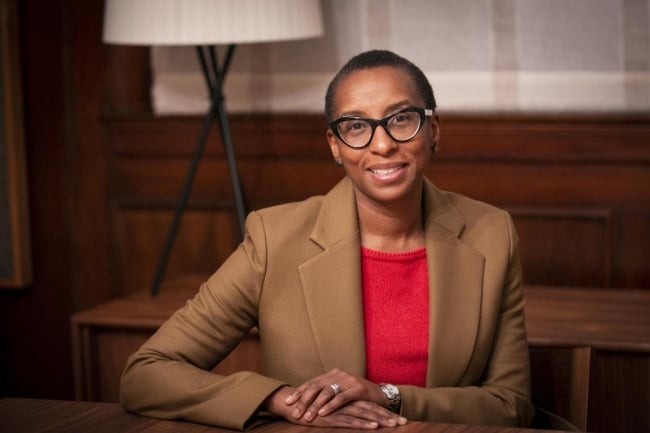You have /5 articles left.
Sign up for a free account or log in.

Claudine Gay will become Harvard’s 30th president when she takes office next summer.
Stephanie Mitchell/Harvard University
Harvard University announced its 30th president Thursday, drawing from within to hire Claudine Gay, the first Black president in the institution’s nearly 400-year history. The daughter of Haitian immigrants, Gay will officially assume the position next summer.
Gay, currently the Edgerley Family Dean of Harvard’s Faculty of Arts and Sciences, was hired after a search that began in July to replace Lawrence S. Bacow, who announced in June that he would step down next year. Though Gay has not previously held a presidency, she has a long history with Harvard. She earned her Ph.D. in government at the university in 1998 and in 2008 joined the faculty in the Department of African and African-American Studies, where she first taught before later climbing the administrative ranks. Prior to Harvard, she taught at Stanford University, where she earned her undergraduate degree in economics.
The Announcement
At a university event Thursday announcing her appointment, Gay reflected on her journey from the child of poor Haitian immigrants who believed firmly in the power of education to a career in academe, leading right up to the Harvard presidency.
“My parents are immigrants from Haiti. They came to the U.S. with very little and put themselves through college while raising our family,” Gay said. “My mom became a registered nurse and my dad a civil engineer. And it was the City College of New York that made those careers possible. College was always the expectation for me. My parents believed that education opens every door.”
During her remarks, Gay also discussed the modern-day social, political, economic and technological changes and challenges society faces, noting that “fundamental assumptions about how the world works and how we should relate to one another are being tested.” She pointed to Harvard’s “long history of rising to meet new challenges, of converting the energy of our time into forces of renewal and reinvention.”
She emphasized that Harvard must be committed to openness and engagement.
“With the strength of this extraordinary institution behind us, we enter a moment of possibility, one that calls for deeper collaboration across the university, across all of our remarkable schools. There is an urgency for Harvard to be engaged with the world and to bring bold, brave, pioneering thinking to our greatest challenges,” Gay said.
Penny Pritzker, senior fellow of the Harvard Corporation and chair of Harvard’s presidential search committee, praised Gay’s personal and professional qualities in a Harvard news release.
“For all her professional accomplishments, even more impressive are Claudine’s personal qualities—her quality and clarity of mind, her broad curiosity about fields beyond her own, her integrity and fair-mindedness, and her dedication to creating opportunities for others. She will be a great Harvard president in no small part because she is such a good person,” Pritzker said.
Reactions Around Higher Ed
When Harvard announced the hire Thursday afternoon, many celebrated the news online, posting congratulations and praising Gay both for her body of work and for making history as the first Black president—and the second woman—to lead Harvard.
“As a member of @Harvard’s Board of Overseers, as an alum, & as an educator, incredibly proud to have voted today in support of Claudine Gay’s election as President. Inspired by her intellect, vision, & deep commitment to students,” tweeted John B. King Jr., a former education secretary under President Barack Obama, who was recently hired as chancellor of the State University of New York system.
Others noted that a Black president at Harvard was long overdue.
“It’s about time,” Shaun Harper, a professor of education and business at the University of Southern California and a diversity, equity and inclusion expert, told Inside Higher Ed by email. “When Ruth Simmons was appointed president of Brown, thereby becoming the first Black person to lead an Ivy League university, I knew she wouldn’t be the last. It’s inspiring that the search committee and Harvard’s governing board members recognized that a Black woman scholar is absolutely capable of leading our nation’s oldest, most prestigious institution.”
Harper noted that many colleges often try—for better or worse—to emulate Harvard. One way that other colleges can follow Harvard’s lead, he said, is by “hiring highly qualified presidents of color.”
Nonwhite presidents make up only a fraction of all college leaders. The 2017 American College President Study from the American Council on Education found that only 17 percent of college presidents are racial minorities and only 5 percent of college presidents are women of color.
Despite the low numbers, an Inside Higher Ed analysis published in February showed that since the 2020 murder of George Floyd, which inflamed racial tensions around the country, colleges have hired greater numbers of minority presidents.
Eddie R. Cole, associate professor of higher education and history at the University of California, Los Angeles, said Gay’s hire is especially significant given Harvard’s legacy of racial discrimination, including its historical ties to slavery, for which the university has since sought to make amends, and a lawsuit over alleged discrimination against Asian students in admissions, which ended up before the Supreme Court.
“This is a historic presidential hire. Leaders in any field—education, business, government—bring their life perspectives into their decision making, and Dean Gay has the potential to bring a fresh vision to Harvard as the first Black president of that university,” Cole told Inside Higher Ed by email. “But this hire also has significance considering its timing. Harvard is faced with pressing questions about race in admissions practices, its atonement for slavery, and its campus racial climate. Many other campuses will be watching to see if Dean Gay will have the autonomy to truly lead Harvard to confront these issues at a time when many campuses are confronted with similar racial challenges.”




